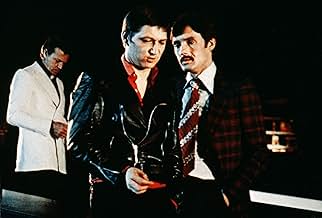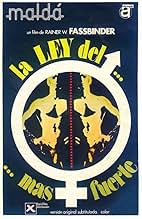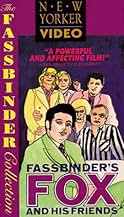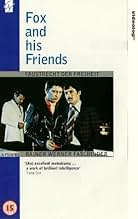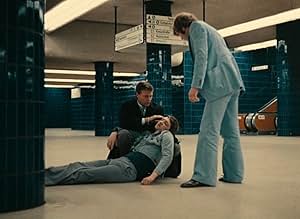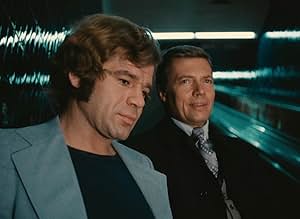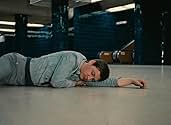AVALIAÇÃO DA IMDb
7,6/10
7,3 mil
SUA AVALIAÇÃO
Um inocente e sugestionável homem da classe trabalhadora ganha na loteria mas se deixa levar por seu novo namorado burguês e seu círculo de amigos materialistas.Um inocente e sugestionável homem da classe trabalhadora ganha na loteria mas se deixa levar por seu novo namorado burguês e seu círculo de amigos materialistas.Um inocente e sugestionável homem da classe trabalhadora ganha na loteria mas se deixa levar por seu novo namorado burguês e seu círculo de amigos materialistas.
- Direção
- Roteiristas
- Artistas
- Prêmios
- 1 vitória no total
Karlheinz Böhm
- Max
- (as Karl-Heinz Böhm)
Harry Baer
- Philip
- (as Harry Bär)
Karl-Heinz Staudenmeyer
- Krapp
- (as Karl Heinz Staudenmeier)
Marquard Bohm
- American Soldier
- (as Marquart Bohm)
- Direção
- Roteiristas
- Elenco e equipe completos
- Produção, bilheteria e muito mais no IMDbPro
Avaliações em destaque
Fox and his Friends caused some controversy when it was first made - it was thought that this story of a gay sideshow worker who wins the lottery, only to be exploited to the hilt by his upper-class lover, was potentially homophobic. Fassbinder himself commented that the story could have been about a heterosexual relationship, but it wouldn't have been as clear.
Fassbinder himself plays Fox - the burly ugly duckling of German cinema miraculously slimmed down, looking almost handsome. Fox's street skills and good humour are undercut by his naivety, as his repellently snobbish boyfriend systematically scams him out of the thousands of marks he's won on the lottery. The story proceeds with ruthless inevitability, as Fox becomes more and more demoralised. Yet the film contains some of Fassbinder's sharpest comedy, particularly in a brilliantly embarrassing dinner party scene. RWF is excellent in the title role; amazing to think that the guy who wrote and directed the film (among so many others) could play a good-natured dimwit with such conviction.
Fassbinder himself plays Fox - the burly ugly duckling of German cinema miraculously slimmed down, looking almost handsome. Fox's street skills and good humour are undercut by his naivety, as his repellently snobbish boyfriend systematically scams him out of the thousands of marks he's won on the lottery. The story proceeds with ruthless inevitability, as Fox becomes more and more demoralised. Yet the film contains some of Fassbinder's sharpest comedy, particularly in a brilliantly embarrassing dinner party scene. RWF is excellent in the title role; amazing to think that the guy who wrote and directed the film (among so many others) could play a good-natured dimwit with such conviction.
A powerful and harrowing melodrama and one of Fassbinder's most accessible movies,this is a must-see for all those interested in intelligent filmmaking.The tragic story of Fox is masterfully and poignantly handled by Fassbinder, while never slipping into sloppy sentimentality.At the same time the film explores sexual and political issues that are still very much relevant.
In "Fox and His Friends" (1975) which Rainer Werner Fassbinder wrote and directed, he played a main character, Franz Bieberkopf alias "Fox", a lower class, uneducated circus worker who loses his job when his lover, the circus owner is arrested and sent to prison for tax fraud. Fox believes in his luck and strikes it rich by winning 500,000 marks in the lottery and very soon attracts the attention of an elegant, posh, and sophisticated Eugen who knows very well how to make Fox pay for his expensive habits and how to make him invest a lot of money in his father business that is not very successful to say the least. What fascinated me the most - how convincingly Fassbinder - one man production company who came up with the idea, wrote the screenplay and directed the movie- played seemingly tough but as it turned, confused and vulnerable Fox. Another interesting aspect of the movie is the way Fassbinder describes the gay community in Germany of the early 70s. He does not make any excuses and he does not make his characters complete villains or innocent victims. The story he tells could've happened in any community.
I'm continually blown away with Fassbinder. And it's all the more affecting because, like all great artists, he challenges your conceptions and forces you to have a new experience. We have to fight our way through his movie, critiquing everything we see. Fox is sure he will win the lottery. Today will be the day. And, he does. Like the ending of "Ordet," this is a cliché embraced, but why? Fassbinder is far too intelligent and original a talent to be conventional without a reason. (In fact, in a regular movie Fox's lottery win would be a thrilling set-piece, sitting in front of a TV screen in a living room, with some dying family member in a hospital bed awaiting money for treatment. Here, we don't even see the win.) Of course the lottery win is a set-up for the way money affects a relationship, especially in gay culture.
Basically, Fassbinder is truth. There's a much more honest depiction of factory work here than in, say, von Trier's later films, where he dotes on the "common" man (just as often, woman) as if a simpleton that we should feel sorry for (I doubt they feel sorry for themselves; von Trier just obliges us to feel that way on their behalf). The mistakes made here are by the controllers of the factory -- it's Fox's scheming lover's father who gets the business bankrupt, and it's Fox, after he lends his lover money to get them out of debt, who screws up the printing. But Fox isn't humiliated by his mistake, whereas a blind, helpless Bjork in "Dancer in the Dark" is made to be a pitiable object. (To be fair, both Fassbinder and von Trier have a tendency to wallow in the miserable.)
Fassbinder focuses his film mainly on the class barrier -- Fox's lover makes insulting comments to him regarding proper manners -- but he's also giving us a kind of gay relationship film noir -- we see ex-lovers kissing (in a ceiling mirror!) behind current lovers' backs, and money corruption plays a large part in the film. (Fox's lover is excellent in his role; he never plays a character who's sole purpose for living is to plot in a corner about how he'll be evil today.) And Fassbinder's view of society as something that destroys people is very noirish (Fox isn't completely in the dark; he does understand he's being used as it's happening). But to be sure, Fassbinder is also detailing the upper-class homosexual in a very critical way; but I think he could have done much more exposing the shallowness of gay culture. (He mainly treats Fox's lover and his ex-/secret lover with peeking-through-keyhole disdain, no doubt partly from Fox's perspective, but I find that somewhat childish and not terribly interesting. It's the view of someone who's been screwed over and feels depressed about it, not someone intent on exposing why people are corrupt, and how.) You don't know quite how to feel about this; in a way Fassbinder is very brave -- he casts himself in an incredibly unromantic role. And at the same time it's interesting because, while Fassbinder doesn't seem too pleased with the superficial manner of the gays whose eyes immediately fixate on money and looks, his own film features an abundance of male nudity early on, of young, very attractive boys that Fox himself is quite attracted to.
On a more technical aspect, there are plenty of interesting shots, of reflections, or obscurities, or of the backs of heads or bodies; one particularly stand-out scene is the one where Fox and his lover are vacationing in Morocco and cruise for a man, and when in a taxi with him the camera observes the festival around them while we listen to their discussion. (The man they pick up is Ali from "Fear Eats the Soul," and many of Fassbinder's stable appear in the film. The fact that it's Ali playing a Moroccan -- albeit, one that's ostensibly gay, so it may not in fact be Ali -- gives the film a self-referential bent, though it's never gimmicky; rather, a continuous web of obsessions; there is a comment on racism inputted in this scene, as well.) The ending of the film is a bit too cruel and heavy-handed, though the pessimist in me appreciates it, the part of me that believes society is a pitiless social system out to wreck anything with a pureness of soul. 9/10
Basically, Fassbinder is truth. There's a much more honest depiction of factory work here than in, say, von Trier's later films, where he dotes on the "common" man (just as often, woman) as if a simpleton that we should feel sorry for (I doubt they feel sorry for themselves; von Trier just obliges us to feel that way on their behalf). The mistakes made here are by the controllers of the factory -- it's Fox's scheming lover's father who gets the business bankrupt, and it's Fox, after he lends his lover money to get them out of debt, who screws up the printing. But Fox isn't humiliated by his mistake, whereas a blind, helpless Bjork in "Dancer in the Dark" is made to be a pitiable object. (To be fair, both Fassbinder and von Trier have a tendency to wallow in the miserable.)
Fassbinder focuses his film mainly on the class barrier -- Fox's lover makes insulting comments to him regarding proper manners -- but he's also giving us a kind of gay relationship film noir -- we see ex-lovers kissing (in a ceiling mirror!) behind current lovers' backs, and money corruption plays a large part in the film. (Fox's lover is excellent in his role; he never plays a character who's sole purpose for living is to plot in a corner about how he'll be evil today.) And Fassbinder's view of society as something that destroys people is very noirish (Fox isn't completely in the dark; he does understand he's being used as it's happening). But to be sure, Fassbinder is also detailing the upper-class homosexual in a very critical way; but I think he could have done much more exposing the shallowness of gay culture. (He mainly treats Fox's lover and his ex-/secret lover with peeking-through-keyhole disdain, no doubt partly from Fox's perspective, but I find that somewhat childish and not terribly interesting. It's the view of someone who's been screwed over and feels depressed about it, not someone intent on exposing why people are corrupt, and how.) You don't know quite how to feel about this; in a way Fassbinder is very brave -- he casts himself in an incredibly unromantic role. And at the same time it's interesting because, while Fassbinder doesn't seem too pleased with the superficial manner of the gays whose eyes immediately fixate on money and looks, his own film features an abundance of male nudity early on, of young, very attractive boys that Fox himself is quite attracted to.
On a more technical aspect, there are plenty of interesting shots, of reflections, or obscurities, or of the backs of heads or bodies; one particularly stand-out scene is the one where Fox and his lover are vacationing in Morocco and cruise for a man, and when in a taxi with him the camera observes the festival around them while we listen to their discussion. (The man they pick up is Ali from "Fear Eats the Soul," and many of Fassbinder's stable appear in the film. The fact that it's Ali playing a Moroccan -- albeit, one that's ostensibly gay, so it may not in fact be Ali -- gives the film a self-referential bent, though it's never gimmicky; rather, a continuous web of obsessions; there is a comment on racism inputted in this scene, as well.) The ending of the film is a bit too cruel and heavy-handed, though the pessimist in me appreciates it, the part of me that believes society is a pitiless social system out to wreck anything with a pureness of soul. 9/10
10Itchload
Fassbinder is an acquired taste in every sense of the word. It took me awhile to be able to fully digest and appreciate his films, and even then it can be difficult.
Fox and His Friends is one of his "accessible" movies, but Fassbinder at his most accessible would probably highly alienate most movie goers.
I've seen this movie 3 times. The first time I thought "that was a good Fassbinder". The second time, I thought the same. The third time, I realized it was brilliant. It might be because I recently bought the amazing dvd, which has an excellent transfer. Fassbinder made his films quickly, very quickly, so a faded old videotape sometimes seems to reflect that. However, when seeing the crisp DVD I realized just how great the camera work was and how well-planned out the movie was.
This would make a good starting point for entering the world of Fassbinder I would think, it has it all: well-framed shots, black humor, and an extremely depressing ending. Depending on how much you can relate to this sort of thing, I would recommend checking it out.
p.s. The last scene was later homaged in My Own Private Idaho (another great movie) and Fassbinder gives a really good performance in the lead.
Fox and His Friends is one of his "accessible" movies, but Fassbinder at his most accessible would probably highly alienate most movie goers.
I've seen this movie 3 times. The first time I thought "that was a good Fassbinder". The second time, I thought the same. The third time, I realized it was brilliant. It might be because I recently bought the amazing dvd, which has an excellent transfer. Fassbinder made his films quickly, very quickly, so a faded old videotape sometimes seems to reflect that. However, when seeing the crisp DVD I realized just how great the camera work was and how well-planned out the movie was.
This would make a good starting point for entering the world of Fassbinder I would think, it has it all: well-framed shots, black humor, and an extremely depressing ending. Depending on how much you can relate to this sort of thing, I would recommend checking it out.
p.s. The last scene was later homaged in My Own Private Idaho (another great movie) and Fassbinder gives a really good performance in the lead.
Você sabia?
- CuriosidadesThe normally overweight Rainer Werner Fassbinder dieted strenuously to lose weight in order to play the role of Fox, which included a full-frontal nude scene.
Principais escolhas
Faça login para avaliar e ver a lista de recomendações personalizadas
- How long is Fox and His Friends?Fornecido pela Alexa
Detalhes
- Data de lançamento
- País de origem
- Centrais de atendimento oficiais
- Idiomas
- Também conhecido como
- O Direito do Mais Forte
- Locações de filme
- Djemaa el Fna, Marrakech, Marrocos(restaurant Marrakech)
- Empresas de produção
- Consulte mais créditos da empresa na IMDbPro
Bilheteria
- Orçamento
- DEM 450.000 (estimativa)
- Faturamento bruto nos EUA e Canadá
- US$ 8.144
- Fim de semana de estreia nos EUA e Canadá
- US$ 11.623
- 16 de fev. de 2003
- Faturamento bruto mundial
- US$ 8.158
- Tempo de duração2 horas 4 minutos
- Mixagem de som
- Proporção
- 1.37 : 1
Contribua para esta página
Sugerir uma alteração ou adicionar conteúdo ausente

Principal brecha
By what name was O Direito do Mais Forte é a Liberdade (1975) officially released in Canada in French?
Responda
